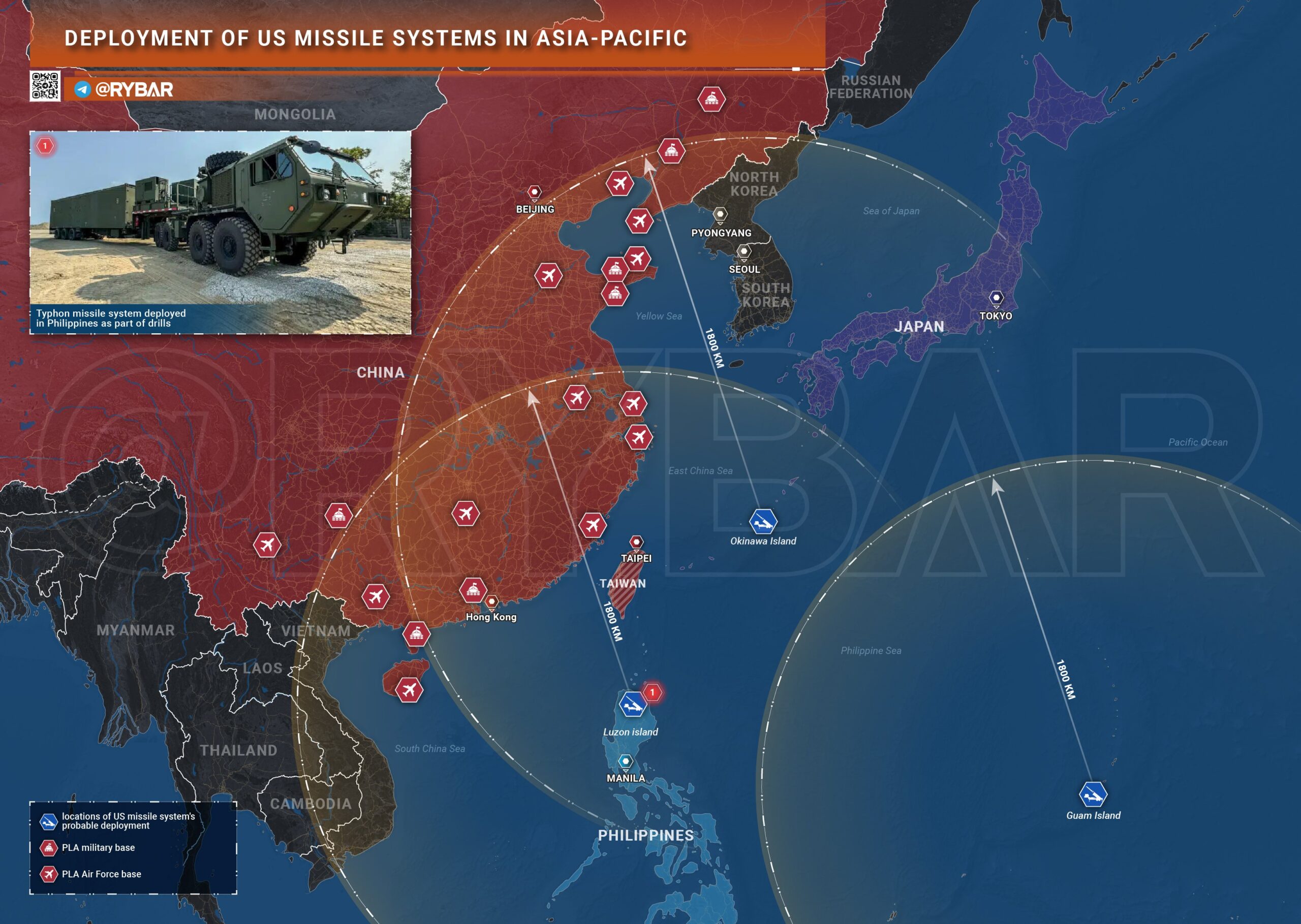Regional Peace At Stake: China's Call For Philippines To Remove Typhon Missiles

Table of Contents
China's Concerns and Strategic Objectives
China views the deployment of Typhon missiles as a direct threat to its territorial claims and military assets in the South China Sea. This perception fuels their demands for removal and underscores the complex strategic considerations at play.
Perceived Threat to Chinese Security
-
Missiles' range and potential to target Chinese bases and vessels: The Typhon missiles' range significantly overlaps with areas claimed by China, including strategically important islands and naval bases. This capability poses a direct threat to Chinese military assets and personnel. The potential for these missiles to disrupt Chinese naval operations in the region is a major concern for Beijing.
-
Increased military presence of the US in the region, potentially fueling the conflict: China sees the US military presence in the region, often in coordination with the Philippines, as emboldening the Philippines and escalating the situation. This perceived US involvement intensifies China's concerns and contributes to the heightened tensions.
-
China's assertion of its historical rights and nine-dash line claims: China's claim to the majority of the South China Sea, based on its historical nine-dash line, is at the heart of this conflict. The missile deployment is seen as a challenge to this claim, further exacerbating the existing disputes.
Diplomatic Pressure and Economic Leverage
China is employing diplomatic pressure and the potential use of economic leverage to force the Philippines to comply with its demands. This strategy highlights China's assertive approach to resolving the dispute.
-
Statements from Chinese officials condemning the missile deployment: High-ranking Chinese officials have issued strong statements condemning the missile deployment, characterizing it as a provocative act that undermines regional stability. These statements are part of a broader diplomatic campaign to pressure the Philippines.
-
Potential implications for trade and tourism between the two nations: China is a major trading partner and tourist source for the Philippines. The threat of reduced trade or restricted tourism could exert significant economic pressure on the Philippines.
-
China's influence on international organizations and forums: China's influence within international organizations and forums provides it with additional leverage. It can use these platforms to isolate the Philippines diplomatically and undermine its position on the missile deployment.
The Philippines' Perspective and Justification
The Philippines justifies the Typhon missile deployment as a necessary measure for self-defense, citing increasing Chinese assertiveness in the South China Sea. This perspective underscores the country's security concerns and its efforts to protect its sovereignty.
Self-Defense and Sovereignty
-
Past instances of Chinese aggression and harassment of Filipino fishing vessels: The Philippines has documented numerous instances of Chinese harassment and aggression against Filipino fishermen in its Exclusive Economic Zone (EEZ). This history fuels the Philippines' belief that a stronger defensive posture is necessary.
-
Importance of protecting the Philippines' Exclusive Economic Zone (EEZ): The deployment of Typhon missiles is presented as crucial for protecting the Philippines' sovereign rights within its EEZ, safeguarding its resources, and ensuring the safety of its citizens.
-
Alliance with the US and potential for increased military cooperation: The Philippines' alliance with the US provides a crucial security umbrella and potential for increased military cooperation. This alliance reinforces the Philippines' stance and provides a counterbalance to China's growing influence.
Balancing Regional Alliances and International Law
The Philippines faces the complex challenge of maintaining its alliances while upholding international law and norms regarding maritime disputes. This delicate balancing act requires careful diplomatic maneuvering.
-
The need to garner international support for its position: The Philippines actively seeks international support for its position, aiming to build a broader coalition against China's assertiveness in the South China Sea.
-
The role of international arbitration and legal frameworks in resolving territorial disputes: The Philippines emphasizes the importance of adhering to international law and the legal frameworks for resolving maritime disputes, including the 2016 arbitral ruling which invalidated China's nine-dash line claim.
-
Potential risks of escalating the conflict through unilateral actions: The Philippines recognizes the potential risks of escalating the conflict through unilateral actions and seeks to manage the situation carefully, prioritizing de-escalation through diplomacy.
Regional and International Implications
The Typhon missile dispute has significant implications for regional and international stability, impacting ASEAN and the broader global power dynamics.
Impact on ASEAN and Regional Stability
-
Potential for increased military spending and arms races in the region: The escalating tensions could trigger an arms race in the region, as countries seek to enhance their military capabilities to counter perceived threats.
-
Risk of miscalculation and accidental escalation of the conflict: The high stakes involved increase the risk of miscalculation and accidental escalation, potentially leading to a larger conflict.
-
Disruption of trade and economic cooperation in the South China Sea: The ongoing tensions pose a threat to trade and economic cooperation in the vital waterways of the South China Sea, impacting regional prosperity.
Global Power Dynamics and US Involvement
The crisis highlights the intensifying competition between the US and China, with global implications.
-
US support for the Philippines and its commitment to regional security: The US has expressed strong support for the Philippines and its commitment to regional security, further complicating the situation.
-
Potential for increased US military presence in the region: The US might increase its military presence in the region to counter China’s growing influence and reassure its allies, potentially further escalating tensions.
-
The role of other major powers in mediating the dispute: Other major powers may play a role in mediating the dispute, seeking to prevent further escalation and find a peaceful solution.
Conclusion
The demand by China for the Philippines to remove Typhon missiles presents a grave challenge to regional peace and stability. The situation demands careful consideration of each nation's security concerns and the potential for uncontrolled escalation. A diplomatic resolution that respects international law and addresses the underlying causes of the conflict is paramount. Continued dialogue, facilitated by international actors, is essential to de-escalate tensions and find a peaceful path forward. Failure to address the issue concerning the deployment of Typhon missiles risks further destabilizing the South China Sea and jeopardizing regional security. We need proactive diplomacy and a commitment to peaceful conflict resolution to prevent further escalation of the tensions surrounding the Typhon missiles in the South China Sea. Finding a solution that respects the sovereignty of all parties and upholds international law is crucial for maintaining regional stability and preventing a larger conflict.

Featured Posts
-
 Is A Natural Disaster Imminent Manga Prediction Causes Tourist Backlash
May 20, 2025
Is A Natural Disaster Imminent Manga Prediction Causes Tourist Backlash
May 20, 2025 -
 Huuhkajat Saavat Vahvistusta Benjamin Kaellmanin Vaikuttava Kehitys
May 20, 2025
Huuhkajat Saavat Vahvistusta Benjamin Kaellmanin Vaikuttava Kehitys
May 20, 2025 -
 Analyzing The Us Missile System Implications For Relations With China
May 20, 2025
Analyzing The Us Missile System Implications For Relations With China
May 20, 2025 -
 Four Star Admiral Bribery Case A Window Into Systemic Problems Within The Navy
May 20, 2025
Four Star Admiral Bribery Case A Window Into Systemic Problems Within The Navy
May 20, 2025 -
 Todays Nyt Mini Crossword Answers For April 13th
May 20, 2025
Todays Nyt Mini Crossword Answers For April 13th
May 20, 2025
